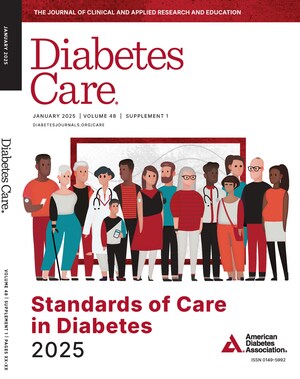CHICAGO, June 15, 2020 /PRNewswire/ -- New results and information surrounding potential "triggers" of the autoimmune process leading to type 1 diabetes (T1D) and how they interact with genetic factors in children at-risk for developing the disease were highlighted in the "Update from the TEDDY Study" symposium today at the American Diabetes Association's® (ADA's) 80th Virtual Scientific Sessions. Similar evidence for celiac disease is also being accumulated through the large international study program. The data The Environmental Determinants of Diabetes in the Young (TEDDY) study has collected prospectively since 2004 will be utilized in new clinical trials to prevent these autoimmune diseases that jointly affect more than 3% of the general population.
TEDDY is an international multi-center trial researching the potential causes T1D in children. The study is funded by the National Institute of Diabetes and Digestive and Kidney Diseases (NIDDK). T1D occurs when the beta cells of the pancreas that normally make insulin are destroyed by the body's own immune system. When the beta cells are destroyed, the body cannot make insulin and maintain normal blood sugar levels.
Children who have T1D have certain types of genes, but not all children who have those genes develop diabetes. Something from the environment "triggers" the immune destruction of the beta cells. TEDDY is aiming to discover viruses and nutritional factors that interact with genes to "trigger" immune destruction of the beta cells, marked by the appearance of islet autoantibodies. The study enrolls infants identified as "at-risk" for developing T1D and follows them for 15 years to look for the appearance of various beta-cell autoantibodies and diabetes. TEDDY has also studied biomarkers that can predict faster or slower progression to diabetes after the autoimmune destruction has begun.
"An interesting finding from TEDDY has been how early the autoimmune destruction of insulin-producing cells begins – often in the initial two years of life," said study TEDDY co-chair Marian Rewers, MD, PhD, a professor of pediatrics and medicine and executive director of the Barbara Davis Center for Diabetes at the University of Colorado School of Medicine. "There appear to be two subtypes of T1D that differ by genetic factors and immune phenotypes. Metabolomic biomarkers may offer clues to the subtypes and whether a child develops T1D. Interestingly, HbA1c has very different predictive characteristics for progression to clinical diabetes in children with islet autoantibodies, compared to adults with risk factors for type 1 diabetes."
Additional key updates from the study group include:
- Persistent presence of enterovirus B species in a child's stool predicts development of islet autoimmunity, especially the earlier subtype characterized by the presence of autoantibodies to insulin.
- There are also subtle differences in the composition and function of gut microbiome in children who develop islet autoantibodies, compared to controls. Early use of probiotics may decrease the risk, while use of antibiotics was not related to islet or celiac autoimmunity.
- TEDDY has also found potentially beneficial effects of vitamin D, vitamin C, or a diet rich in polyunsaturated fatty acids, though these observations need to be confirmed in randomized clinical trials.
Celiac disease, another autoimmune condition, shares many genetic factors with T1D, noted Dr. Rewers. TEDDY investigators follow study participants for both T1D and celiac disease in an attempt to determine why some children with high-risk genes develop T1D or celiac disease, while most remain disease-free. This information will be used to try to prevent both diabetes and celiac disease in children. Recently reported TEDDY research showed an association between gluten consumption in the early years of childhood and an increased risk of celiac disease among genetically predisposed children.
"While T1D and celiac disease share a lot of genetic characteristics, there are intriguing differences in the ways these diseases develop and progress," added Dr. Rewers. "TEDDY is contributing exciting clues for design of future trials to prevent both T1D and celiac disease."
Research presentation details:
- Dr. Rewers and other TEDDY investigators presented the latest trial research in the symposium, Update from the TEDDY Study.
- Date: Tuesday, June 16, 8:00 – 10:00 a.m. CT (all sessions will be recorded and available for viewing for up to 90 days)
For more information or to schedule an interview with Dr. Rewers, please contact Daisy Diaz by phone at (703) 253-4807 or by email at [email protected].
About the ADA's Scientific Sessions
The ADA's 80th Scientific Sessions, the world's largest scientific meeting focused on diabetes research, prevention and care, will be held virtually June 12-16, 2020. Leading physicians, scientists and health care professionals from around the world will unveil cutting-edge research, treatment recommendations and advances toward a cure for diabetes. Though the conference will be remote this year, attendees will receive exclusive access to nearly 2,000 original research presentations and take part in provocative and engaging exchanges with leading diabetes experts. Learn more and register at scientificsessions.diabetes.org and join the Scientific Sessions conversation on social media using #ADA2020 and #ADAGoesVirtual.
About the American Diabetes Association
Every day more than 4,000 people are newly diagnosed with diabetes in America. More than 122 million Americans have diabetes or prediabetes and are striving to manage their lives while living with the disease. The American Diabetes Association (ADA) is the nation's leading voluntary health organization fighting to bend the curve on the diabetes epidemic and help people living with diabetes thrive. For nearly 80 years the ADA has been driving discovery and research to treat, manage and prevent diabetes, while working relentlessly for a cure. We help people with diabetes thrive by fighting for their rights and developing programs, advocacy and education designed to improve their quality of life. Diabetes has brought us together. What we do next will make us Connected for Life. To learn more or to get involved, visit us at diabetes.org or call 1-800-DIABETES (1-800-342-2383). Join the fight with us on Facebook (American Diabetes Association), Twitter (@AmDiabetesAssn) and Instagram (@AmDiabetesAssn).
Contact: Daisy Diaz
703-253-4807
[email protected]
SOURCE American Diabetes Association

Related Links
WANT YOUR COMPANY'S NEWS FEATURED ON PRNEWSWIRE.COM?
Newsrooms &
Influencers
Digital Media
Outlets
Journalists
Opted In






Share this article